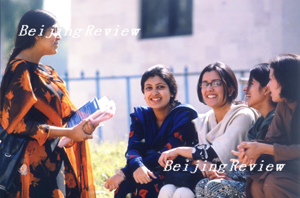
Walking in the streets of Pakistan, locals are eager to greet visitors from China with a friendly nihao (hello) and shy waves from behind curious looks. It's a sign of the friendship that has been quietly nurtured between the two countries over the past 55 years of diplomatic relations.
The sentiments were echoed by Pakistani Prime Minister Shaukat Aziz, when he told a visiting Chinese media delegation in Islamabad on March 11, that as strategic friends, China and Pakistan have a multifaceted relationship, which is based on the premise of mutual advantages and a sense of sharing.
According to General Jamshed Ayaz Khan, President of the Institute of Regional Studies in Islamabad, a nationwide opinion poll on "Pakistan's best friends in the world" was conducted recently, and China came out tops.
Dr. Wang Wei, Director of the Office of South Asian Studies under the China Association for International Friendly Contact, speculated that if a similar opinion poll were to be run in China, the result could well be similar.
According to Wang, who has been studying the relationship between China and South Asian countries for more than 10 years, the two countries have avoided disputes ever since the establishment of diplomatic relations in 1951. The basis of such stable relations is diverse, and includes mutual national interests, common strategic consensus, mutual respect of sovereignty and non-interference, sincerity and support of the peoples. China gives assistance without any conditions and always appreciates the help it receives.
It is a relationship "deeper than the oceans and higher than the mountains," as described by both President Hu Jintao and President Pervez Musharraf on the latter's third state visit to Beijing in February.
Historically, Pakistan has also played important roles in establishing diplomatic relations between China and the United States. One example is former U.S. Secretary of State Henry Kissinger's icebreaking visit to Beijing in 1971, which started from Peshawar, Pakistan.
In its own right, as a big Islamic country with a population of 160 million, as well as being the sole nuclear country in the Islamic world, Pakistan holds an important position among developing countries worldwide as well as in the Islamic world.
China's energy corridor
Recently Pakistan has called on China to consider its role as an energy and trade corridor between China and the Middle East. President Musharraf first raised this idea and elaborated on it in an exclusive interview with Beijing Review.
He stressed Pakistan's geographic advantage, which is important to China. Located between South Asia, China and Central Asian republics, Pakistan is a country that cannot be ignored by anyone who wants to interact between these regions.
As a large economy with rapid economic growth, China imports oil from Saudi Arabia and transports the oil on a long route around its east coast. China also trades with Europe, Africa, the Middle East and India. But how China could facilitate all this trade along its lengthy east coast is a problem. Musharraf had the answer.
"China can route through Pakistan. Because of our friendship with China and Central Asian republics, we would like to provide a shortcut route and contribute to all kinds of trade and energy cooperation," Musharraf stressed.
Pakistan borders China's Xinjiang Uygur Autonomous Region, and has a comparatively convenient and secure transportation network in place.
| 